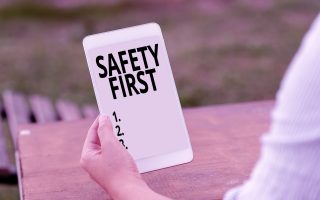
Most of us move through our days juggling work, family, and endless distractions. But when you fail to stay aware of your surroundings or your own decisions, the consequences can be serious. Not paying attention can lead to accidents, financial mistakes, or missed opportunities that cost you time and money. Being mindful isn’t about paranoia—it’s about prevention. Understanding where lapses in awareness happen most often can help you protect yourself and your budget. Let’s look at six common situations where not paying attention could put you at risk.
1. Driving While Distracted
Distracted driving is one of the most dangerous examples of not paying attention. A quick glance at a text message, reaching for something in the back seat, or adjusting a playlist can change your life in seconds. Even hands-free calls can pull your focus away from the road long enough to miss a hazard. Staying alert means putting the phone away, keeping both hands on the wheel, and treating driving as your only task. The cost of a moment’s distraction can be far more than a ticket—it can be a life.
Many drivers underestimate how long their eyes leave the road when multitasking. Five seconds at highway speed equals the distance of a football field covered blindly. The next time you’re tempted to check your phone, remind yourself that your attention is worth more than any notification.
2. Ignoring Financial Details
When it comes to money, not paying attention can quietly drain your finances. Small charges, forgotten subscriptions, and overlooked fees add up fast. Many people don’t review their bank statements, assuming everything is fine until a problem appears. But catching errors or fraud early requires vigilance. Make it a habit to check your accounts weekly and review each charge.
Using free budgeting tools like Mint can help you track spending automatically. But even with automation, you still need to stay alert. Set reminders to review statements and update your passwords regularly. Financial awareness isn’t just about saving money—it’s about protecting what you already have.
3. Overlooking Workplace Safety
At work, especially in physical or industrial settings, failing to pay attention can lead to serious injuries. Even in an office, tripping hazards, overloaded outlets, or poor ergonomics can cause harm. Many accidents happen when people rush or assume they “know the routine.” Staying mindful of safety procedures and your environment helps you avoid preventable mistakes.
Supervisors often stress training, but real safety depends on individual awareness. Before starting any task, pause for a second to assess risks. That small moment of attention could prevent a costly accident or lost work time. Remember, staying safe starts with staying alert.
4. Falling for Online Scams
In the digital world, not paying attention can expose you to identity theft or fraud. Scammers rely on distraction and urgency—an email that appears to be from your bank, a fake delivery notice, or a seemingly harmless social media link. When you’re tired or rushing, it’s easy to click without thinking. Always verify the source before sharing personal information or clicking links.
Check email addresses carefully and hover over links to see where they lead. Use strong, unique passwords and enable two-factor authentication. The extra seconds you spend confirming a message’s legitimacy can save you hours of frustration and financial loss later. Staying alert online is just as important as being cautious in person.
5. Neglecting Health Warning Signs
Health issues often start small—a mild pain, fatigue, or unusual symptom. Not paying attention to these early signs can allow problems to worsen. Many people delay doctor visits because they’re busy or assume symptoms will pass. But ignoring your body’s signals can lead to more serious complications down the road.
Make it a habit to check in with yourself regularly. Track changes in sleep, mood, or energy. Schedule preventive care and follow up on test results. If something feels off, don’t dismiss it. Prioritizing your health means paying attention before small issues become big ones. A little awareness today can save you from major medical bills tomorrow.
6. Skimming Contracts and Agreements
Whether you’re signing a lease, a loan, or a service contract, not paying attention to the fine print can trap you in unfavorable terms. Many people skip the details because the language feels tedious or confusing. But buried clauses can include hidden fees, early termination penalties, or automatic renewals. Taking time to read and understand every section is worth it.
If a document seems unclear, ask questions or seek help from a trusted resource. Don’t let impatience cost you later. When it comes to contracts, attention equals protection.
Building Awareness into Everyday Life
Not paying attention isn’t just a bad habit—it’s a risk factor that touches every part of life. From driving safely to managing money, awareness helps you stay in control. The more you practice being present, the easier it becomes to notice details before they turn into problems. You don’t need to live in constant alert mode, but you do need to stay engaged with what’s happening around you.
Think about where you might be operating on autopilot. Could you slow down a little, double-check something, or give a task your full focus? Paying attention protects your safety, your finances, and your peace of mind. Where do you think paying closer attention could make the biggest difference in your daily routine?
What to Read Next…
- 5 Things to Look for When Youre Researching a Company for a Job
- Stop Wasting Your Time 7 Signs Hes Not Husband Material
- 7 Ways to Stay Safe While Out for a Run or Walk Alone
- 5 Dangerous Safety Tips Women Still Believe That Dont Work
- 5 Ways to Spot a Fake Uber or Lyft Driver and What to Do If It Happens to You

Travis Campbell is a digital marketer and code developer with over 10 years of experience and a writer for over 6 years. He holds a BA degree in E-commerce and likes to share life advice he’s learned over the years. Travis loves spending time on the golf course or at the gym when he’s not working.







